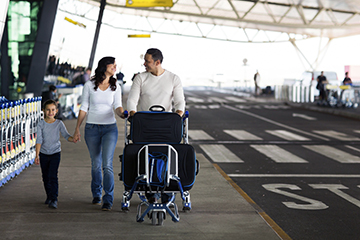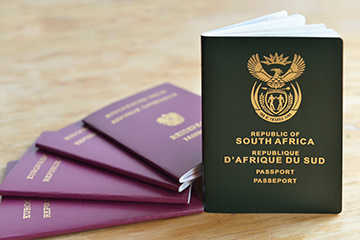Getting a visa to travel in and out of South Africa has become slightly more challenging.
The new visa regulations will affect not only parents wanting to travel with their children, but businesses looking to trade in South Africa, and people who are looking to work in South Africa as well.
It will also affect foreign students who want to study here as well as overseas visitors who want to explore our country and province.
The current visa regulations which came into effect on 1 June 2015, states the following:
- You need to apply for a visa at an embassy in your home country.
- Every child will need to have their own passport.
- Children under the age of 18 will need to have an unabridged birth certificate with them when travelling overseas (Note: this can take up to 6 months to get).
- Visitors who want to change their visas must submit a 60 day application before the current visa expires.
- Businesses are now required to get a recommendation letter from the Department of Trade and Industry (DTI), which needs to do an in-depth assessment of how feasible the business is and what contribution it will make to the national interest of our country which could cause major delays in the process.
- Job seekers who are applying for work in South Africa will be required to get a certificate from the Department of Labour along with a document to prove that their qualifications have been approved by the South African Qualifications Authority (SAQA).
 This has to be translated into 1 of the 11 official languages. Thereafter their work visa will be valid for 5 months.
This has to be translated into 1 of the 11 official languages. Thereafter their work visa will be valid for 5 months.
- If you have a study visa, you may not work part-time for more than 20 hours a week.
- Both study and exchange visas will be issued for the duration of the study period or the exchange programme.
The Western Cape Government proposed plans for the current visa regulations
The Western Cape Government’s Minister of Economic Opportunities, Alan Winde gave the national government a complete evaluation of the impact the visa regulations will have and he requested that it be considered by the inter-ministerial committee to assess the new rules.
The following table lists Minister Winde’s proposals:
| Type of improvement |
What it entails |
|
Regulatory changes (Proposed changes to the currect regulations by the Red Tap Reduction Unit)
|
- Replacing the requirement for unabridged birth certificates for countries with similar identification documents.
- Allowing third applications made by third parties such as immigration practitioners.
- Offering visas on arrival, as countries such as Bolivia, Ethiopia and Rwanda do.
- Providing for an electronic visa application system, where tourists can apply for visas online instead of having to apply at a South African embassy in person.
- Collecting biometric data on arrival at airports, instead of travellers having to travel sometimes to a neighbouring country for fingerprints to be taken.
- Not requiring biometric visas from countries where we seek to grow tourism, as Australia does.
- The Department of Home Affairs (DHA) should formally accept certified copies of passports and identification documents.
- Not requiring visas from travellers from Brazil, Russia, India, China and South Africa (BRICS).
- Changing regulations to allow for applications to change your visa status while in South Africa.
- Removing the hospitality industry, or at least the catering and accommodation industry, from the undesirable list for business visas.
- Considering renewal of intra-company visas after a period of 4 years.
- Finalising the critical skills list in agreement with the South African Qualifications Authority (SAQA) and relevant professional bodies, as well as the list of professional bodies and councils.
- Revising the requirement that unmarried couples must provide official recognition from a relevant authority in their country of residence, to prove their relationship when applying for spousal visa.
|
| Improve systems/efficiency |
- Creating the required capacity and improving efficiency at the DHA offices (and also SA missions) to ensure that processes are finalised and documents issued timeously, through educating staff and implementing efficient systems.
- Ensuring that all DHA officials (nationally and at foreign missions) understand the legislation and regulations to minimise the possibility of misinterpretation (such as declaring tourists undesirable).
- Reinstating the DHA Tracking System in order for applicants to be able to track the status of their application.
- Installation of sufficient biometric systems at embassies, ports, and the DHA offices.
- Clarifying the misinterpretation that language schools have to be registered with the Department of Higher Education and Training.
|
| Improve communication |
- Engaging with industry to explain the processes and requirements to comply with the regulations.
- Developing easy-to-use guidelines on what the requirements for different types of visas are, and communicate this with all relevant stakeholders.
- Communicating the correct processes (Standard Operating Procedures) to be followed with airlines.
- Communicating Department of Trade and Industry findings regarding applications for business and corporate visas to applicants as well, so applicants can appeal decisions and/or provide more information.
|
Through Minister Winde’s proposals, the Western Cape Government seeks to ensure that everyone travels safely, easily and Better Together.
For more information, visit the Red Tape Reduction Unit on:
Website: https://www.westerncape.gov.za/redtapereduction/, or
Contact: 086 1888 126, or
Email: redtape@westerncape.gov.za.

 This has to be translated into 1 of the 11 official languages. Thereafter their work visa will be valid for 5 months.
This has to be translated into 1 of the 11 official languages. Thereafter their work visa will be valid for 5 months. 

